
The high ground that The Brave One never recovers is taken early in the film, after Erica Bain (Jodie Foster) and her boyfriend are accosted in Central Park by thugs who kill him and put her in the hospital. Director Neil Jordan cuts back and forth from a flashback showing the couple making love to the present-tense aftermath of the attack: limp bodies, and clothing scissored away from blood-caked skin. I doubt this sobering editorial flourish was a screenwriter's creation — more likely it was cooked up by Jordan and his editor, Tony Lawson, who was an assistant on Nicolas Roeg's Don't Look Now. It points up the fact that The Brave One is well-made in a number of important ways — it boasts sensitive direction, colorful widescreen camerawork, and a fine, voice-centered performance from Jodie Foster. It’s disappointing that it’s not a better movie.
The story is straightforward revenge-thriller material — Bain buys a 9mm pistol and takes criminal justice into her own hands. Along the way she befriends Mercer (Terrence Howard), an earnest detective who
befriends Erica while (of course) investigating the rash of vigilante killings. So our story begins with a
brutal murder and ends with multiple acts of audience-pleasing vengeance, and the
material in between is peppered with explosions of violence. So far, so good. (Hey, Ms. 45 is one of my favorite movies.) But the film is executed as a think piece, with Foster playing a woman so full of fear and anger that she loses her moral compass entirely. That's fine, too, but the difference between the movie's twin impulses — is this a Death Wish update or a highbrow character study? — creates a conflict that the script doesn't support and Jordan can't reconcile. It reminds me of In the Cut, another serious movie by serious filmmakers who seemed too aware that they were slumming in the material. I admire what Jordan's trying to accomplish here, but this sort of thing demands the hand of a director who's less, shall we say, earnest about it. C+
![]()
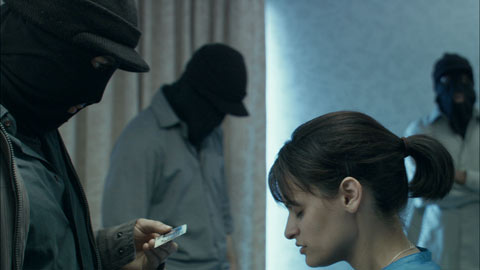
Day Night Day Night (IFC)
I think of Day Night Day Night in some ways as a companion film to United 93. One is about a real event, one is imagined. One uses handheld camera and fast edits to convey a sense of urgency and naturalism, one gets much the same effect through long takes and subjective camerawork. Both are utterly gripping studies of how people react in high-stress situations — one is about the victims of terrorism, the other about the perpetrators. The protagonist of Day Night Day Night is an unnamed young woman (Luisa Williams) who has chosen to leave her life and her family behind to carry a bomb into Times Square in a backpack and detonate it. Writer/director Julia Loktev keeps all this material non-specific — the masked men who prep her for the job seem American; the guy who drives her into the city looks Korean; the folks who make the bomb look ... Jewish, maybe? It doesn't matter. Loktev forces audience identification with her as a frightened woman looking for redemption, not as a symbol of any specific political beef, by keeping the camera close to her face and body, and in certain moments showing us exactly what she sees. (Cinematographer Benoît Debie, who also shot Gaspar Noe's Irreversible, knows a thing or two about the subjective camera.) It's a slow-paced, methodical film, and also a very smart and instructive one that's sympathetic to its sad bomber without forgiving her her intentions.
Buy it from Amazon.com: Day Night Day Night![]()
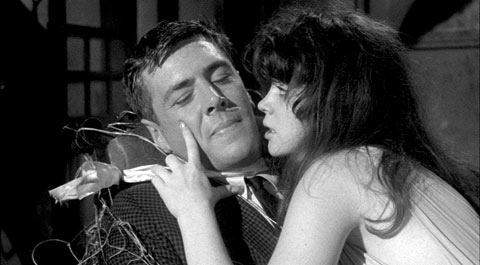 Spider Baby (MTI Home Video)
Spider Baby (MTI Home Video)This is a week late, but the folks at MTI Home Video were kind enough to send me a review copy of their September 25 release of Spider Baby, a movie whose reputation I knew well but had somehow managed to avoid until now. To my delight, it's an entirely excellent B-grade horror comedy that exhibits director Jack Hill's trademark good-natured humor but also manages to crank up an impressive creep factor in a couple of scenes and fulfills its disturbo potential without being self-consciously transgressive. (This was strong material for the mid-1960s.) The cast, including Lon Chaney Jr. and latter-day Rob Zombie stalwart Sid Haig, is generally very good — and Jill Banner, the big-eyed newcomer who played the arachnophilic slasher Virginia (pictured), is sexy as all hell. The DVD image quality is excellent and "The Hatching of Spider Baby," a new short documentary consisting of latter-day interviews with the stars and filmmakers, is good fun as well. There's also an audio commentary with Hill and Haig. My only quibble is with the audio track, which starts to exhibit a droning noise that sounds like digital distortion in the film's midsection. (Whether this artifact was introduced by this particular DVD transfer I can't say.) Otherwise it's an excellent release.
Buy it from Amazon.com: Spider Baby (Special Edition)

The first half of Feast of Love is a near-riot of sex and skin. Every few minutes, it seems, a different youngster is pulling off her blouse or dropping his trou. Nearly everyone in the film is depicted banging or getting banged by someone else, and there's an athletic undertone to the various pairings-off that suggests the vitality of youth — one woman seduces another on a softball diamond, a couple does it on a football field (and, later, in front of a video camera). Like director Robert Benton's earlier Twilight, it's specifically an old man's movie, and one that contemplates the bodies of beautiful young people in order that it may more fully appreciate the predicament old people find themselves in.

Not long ago, a friend emailed me to say she had recently NetFlix'd a "little B movie." She said she enjoyed it, but her tone suggested that she was reluctant to go too far with an endorsement of such a lowbrow film. Had I seen it, she asked?
The name of the movie was Exotica. Why did that blow my mind?
![]()

Black Book (Sony)
After the crash-and-burn that ended Paul Verhoeven's career as a director of big-budget Hollywood blockbusters, the director took some time off from filmmaking before returning to his native country, the Netherlands, to make this World War II potboiler reeking of sex and betrayal. Star Carice van Houten is all wide eyes and pursed, pouty lips — shoot her in monochrome and you'd swear you were watching an actress from a 1940s melodrama. (Well, but for her copious nudity, I suppose.) It's not a great film, but a very entertaining one — certainly good enough to qualify as Verhoeven's comeback. Looking back at my original review, I'm surprised I gave it only a B, not a B+.
Buy it from Amazon.com: Black Book![]() or Black Book [Blu-ray]
or Black Book [Blu-ray]![]()
Knocked Up (Universal)
There's something so close to offensive simplemindedness about this whole enterprise that it's a wonder the results are so strong — dirty, funny, and only suffering from a general adherence to mainstream formula. The subjects of pregnancy and childbirth really do add a new dimension to the ever-present sex comedy, and Judd Apatow's witty, family-values approach (only glancing reference is made to abortion, and you have to figure a Hollywood comedy isn't going there anyway) manages to avoid pandering.
Buy it from Amazon.com: Knocked Up (Unrated Widescreen Edition)![]() , Knocked Up - Unrated (Two-Disc Collector's Edition)
, Knocked Up - Unrated (Two-Disc Collector's Edition)![]() , or Knocked Up [HD DVD]
, or Knocked Up [HD DVD]![]()
Into the Wild, Sean Penn's sprawling, stumbling, epic biopic adapted from Jon Krakauer's best-selling book, borrows heavily from the kind of American film that defined the idea of the road movie. It features zooms, split screens, jump cuts, and a song score by a growling Eddie Vedder that wouldn't feel at all out of place on 70s radio. (With backing vocals by Corine Tucker, he revives "Hard Sun," a 1989 anthem by Indio, a band too obscure to have even a Wikipedia entry or Allmusic biography, to great effect.) Cinematographer Eric Gautier (The Motorcycle Diaries, Clean, Those Who Love Me Can Take the Train) favors long lenses here, the kind that can isolate one subject twixt foreground and background and then, dramatically changing their plane of focus, seek out another. They emphasizes the distances involved in the open spaces where much of the film takes place, and their voyeuristic qualities echo the book's theme of observation across a temporal distance. Christopher McCandless (Emile Hirsch) was found dead in an abandoned bus in the Alaskan wilderness. It was Krakauer's job to figure out how an upper-middle-class kid ended up there; it's Penn's to imagine what the journey might have looked like.

Low-budget horror auteur Larry Fessenden (Habit, Wendigo) has a truly clever set-up for his latest shiverfest. Climate change is making life difficult for a group of blue-collar types (think Alien and especially The Thing) working to get oil out of the Alaskan wilderness by melting the ice roads and thawing the frozen tundra, making both unsafe for trucks. As the film progresses, the crew is slowly driven insane, either by "sour gas" being released out of the softening ground, or by some kind of vengeful earth-spirit that's been stirred up by exploitation of the area's natural resources. It's a global-warming horror movie.
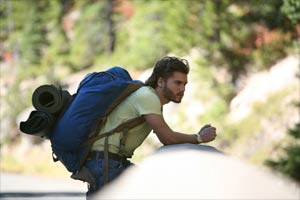
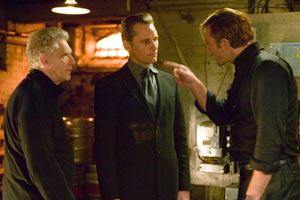
 Richard
Flanagan's blistering diatribe on exploitation, xenophobia, and
post-9/11 paranoia is all about an Australian stripper mistaken for
a terrorist by authorities newly empowered by a down-under analog to
the Patriot Act and, more disastrously, an aging telejournalist angling
for one last, sensational scoop. Flanagan's prose can feel didactic, with over-explicit descriptions of his character's thoughts -- and sometimes this
reads more like a lecture than a thriller -- but his indignation is
ferocious and the results are occasionally chilling. I may have missed
subtleties related to Sydney's culture and/or politics, but what
resonates most is the protagonist's heartbreak at realizing not only
that the people around her are indifferent to suffering and injustice,
but that she has lived her own life at a similar emotional remove. That
distance, she learns, is a killer.
Richard
Flanagan's blistering diatribe on exploitation, xenophobia, and
post-9/11 paranoia is all about an Australian stripper mistaken for
a terrorist by authorities newly empowered by a down-under analog to
the Patriot Act and, more disastrously, an aging telejournalist angling
for one last, sensational scoop. Flanagan's prose can feel didactic, with over-explicit descriptions of his character's thoughts -- and sometimes this
reads more like a lecture than a thriller -- but his indignation is
ferocious and the results are occasionally chilling. I may have missed
subtleties related to Sydney's culture and/or politics, but what
resonates most is the protagonist's heartbreak at realizing not only
that the people around her are indifferent to suffering and injustice,
but that she has lived her own life at a similar emotional remove. That
distance, she learns, is a killer.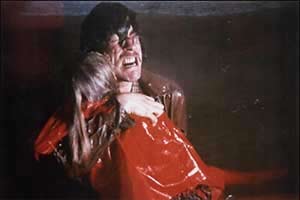
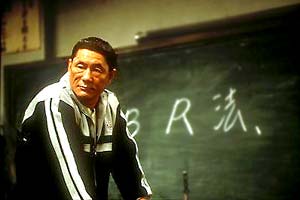
 BRYANT FRAZER is a journalist and film critic based in Sleepy Hollow, New York, home of the Headless Horseman. He's the editor-in-chief of
BRYANT FRAZER is a journalist and film critic based in Sleepy Hollow, New York, home of the Headless Horseman. He's the editor-in-chief of 